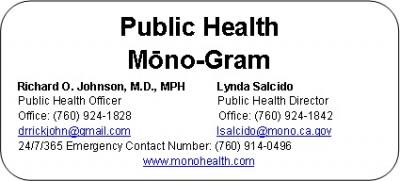Mono-Gram - Zika Virus Disease FAQ’s 02/09/2016
February 9, 2016
Zika Virus Disease FAQ’s
Q: What is Zika virus?
A: Zika is an infectious disease caused by the Zika virus, which is transmitted to people by Aedes aegypti and Aedes albopictus mosquitos. Most infected people have no symptoms. The illness is usually mild, and severe disease requiring hospitalization is uncommon. If symptoms develop, the most common are fever, rash, joint pain, and/or red eyes. Symptoms usually begin 3-7 days after a person is bitten by an infected mosquito and last several days to a week. There is no specific treatment for Zika virus disease. The only treatment option available is the provision of supportive care including rest, fluids, and use of analgesics and antipyretics.
Q: What should Californians know about Zika?
A:The California Department of Public Health (CDPH) is monitoring the Zika virus outbreak in Latin America closely. As of February 5, 2016, there have been six confirmed cases of Zika virus disease reported in California residents, all in travelers returning from other countries with Zika virus outbreaks. These cases occurred in 2013 (1), 2014 (3), and 2015 (2). CDPH has also been notified of one preliminary positive case of Zika for 2016.
Q: What’s the relationship between Zika virus and microcephaly in newborns?
A: There is a possible association between Zika and microcephaly (abnormally small head and brain) in newborns. It is suspected that women who get infected with Zika virus may pass the virus to the developing fetus if they are pregnant. However, there are many causes of microcephaly in babies, and whether Zika virus infection causes microcephaly has not been confirmed. Studies are needed to understand this possible relationship.
Q: What is the likelihood of Zika virus circulating in California?
A: There has been no known transmission of Zika virus in California and it is unlikely that Zika virus would spread significantly in the state. It is possible that a returning traveler infected with Zika virus could be bitten by an Aedes mosquito carrying the virus and that mosquito could bite someone else, transmitting the virus. However, because of housing conditions, water management, and mosquito control practices in California, there is generally less contact between humans and Aedes mosquitoes than in other countries. It is important that Californians avoid mosquito bites while traveling to affected areas to prevent these illnesses and their importation to California. It is also important that California residents, particularly those living in counties where the Aedes mosquito has been found, avoid being bitten by mosquitoes. These mosquitoes have been found in 12 California counties in the last few years (see map at http://www.cdph.ca.gov/HealthInfo/discond/Documents/AedesDistributionMap.pdf). CDPH and local vector control districts will continue to collaborate to control and limit further spread of Aedes mosquitoes in the state.
Q: What happens if you’re infected? Is there a cure?
A: There is no specific treatment for Zika. Talk with your health care provider about medications to help reduce fever and pain; rest and fluids are also helpful. Those who do show symptoms usually feel better in about a week.
Q: Should Californians be concerned?
A: To date, there has been no known transmission of Zika virus in California and the risk of Zika virus transmission in California is low. However, Californians traveling to regions where Zika virus transmission is ongoing should follow the recommended precautions listed above and provided in the CDPH Health Advisory (http://www.cdph.ca.gov/HealthInfo/discond/Documents/CDPHZikaVirusHealthAdvisory.pdf), and by CDC (http://www.cdc.gov/zika/index.html).
Q: Is California taking any precautions?
A: CDPH has informed all local health departments of the Zika virus situation and issued a health advisory that supports national recommendations from the CDC. CDPH has ongoing surveillance for human cases of other viral illnesses that are transmitted by the same mosquitoes as Zika virus disease (dengue and chikungunya). CDPH is building on this system by asking health care providers to report Zika virus disease. Also, in the past few years, CDPH has been working with local vector control agencies to address the spread of Aedes mosquitoes in California.
Q: How are local public health departments being instructed to monitor for Zika virus?
A: Local health departments are notified by health care providers of suspected Zika virus disease. In addition, local health departments are being contacted to help arrange Zika virus testing. The local health departments then conduct a follow-up of the potential case to determine travel history and other important factors. The information collected by local health departments is then report to CDPH.
Q: What else would state health officials like to say about the virus that isn't part of the CDC advisory released last week?
A: Travelers returning from areas where Zika outbreaks are ongoing should let their doctor know if they have fever and other symptoms of Zika. Patients with suspect Zika, chikungunya, or dengue should avoid being bitten by mosquitoes during the first week of illness to prevent spreading their infection further.
Q: If I am pregnant or trying to become pregnant, what should I do in terms of travel to these areas?
A: Until more is known, and out of an abundance of caution, CDPH recommends special travel precautions for pregnant women and women trying to become pregnant:
Pregnant women in any trimester should consider postponing travel to areas where Zika virus transmission is ongoing. Pregnant women who must travel to one of these areas should talk to their healthcare provider first and strictly follow steps to avoid mosquito bites during the trip.
Women trying to become pregnant should consult with their healthcare provider before traveling to these areas and strictly follow steps to avoid mosquito bites during the trip.
Pregnant women who traveled to an area with ongoing Zika virus transmission during pregnancy should be evaluated for Zika virus infection if they had any symptoms suggestive of Zika within 2 weeks of travel, or if their baby has evidence of microcephaly. Other mosquito-borne virus infections, such as dengue and chikungunya, should be ruled out in these patients.
The CDC has updated its interim guidelines for U.S. health care providers caring for pregnant women during a Zika virus outbreak. Updated guidelines include a new recommendation to offer serologic testing to asymptomatic pregnant women (women who do not report clinical illness consistent with Zika virus disease) who have traveled to areas with ongoing Zika virus transmission. Testing can be offered 2–12 weeks after pregnant women return from travel. The article noted that the interpretation of results among asymptomatic women is complex because of cross-reactivity among related flaviviruses, such as dengue, yellow fever, and West Nile viruses. This update also expands guidance to women who reside in areas with ongoing Zika virus transmission, and includes recommendations for screening, testing, and management of pregnant women and recommendations for counseling women of reproductive age (15–44 years). In terms of prevention, the recommendation is made for health care providers to discuss reproductive life plans, including pregnancy intention and timing, with women of reproductive age in the context of the potential risks associated with Zika virus infection.
http://www.cdc.gov/mmwr/volumes/65/wr/mm6505e2er.htm?s_cid=mm6505e2er_e
Q: What can be done to protect oneself?
A: There are no vaccines to prevent Zika infection. Preventing mosquito bites is important to avoid becoming infected.
Use insect repellents containing DEET, picaridin, IR3535, oil of lemon eucalyptus, or para-menthane-diol for long lasting protection. If you use both sunscreen and insect repellent, apply the sunscreen first and then the repellent.
If you are traveling to a region affected by Zika, chikungunya, or dengue, you should take appropriate precautions for avoiding mosquito bites during the day and at night.
Using insect repellent is safe and effective. Pregnant women and women who are breastfeeding can and should choose an EPA-registered insect repellent (such as DEET, picaridin, or IR3535) and use it according to the product label.
When weather permits, wear long-sleeved shirts and long pants.
Use air conditioning or window/door screens to keep mosquitoes outside. If you are not able to protect yourself from mosquitoes inside your home or hotel, sleep under a mosquito bed net.
Help reduce the number of mosquitoes outside your home or hotel room by emptying standing water from containers such as flowerpots or buckets.
Q: What about the risk of sexual transmission?
Sexual transmission of Zika virus is possible, and is of particular concern during pregnancy. Current information about possible sexual transmission of Zika is based on reports of three cases. The first was probable sexual transmission of Zika virus from a man to a woman, in which sexual contact occurred a few days before the man’s symptom onset. The second is a case of sexual transmission currently under investigation in Dallas, Texas. The third is a single report of Zika virus isolated from semen at least 2 weeks and possibly up to 10 weeks after illness onset. The man had no sexual contacts. Because no further testing was conducted, the duration of persistence of Zika virus in semen remains unknown.
In all three cases, the men developed symptomatic illness. Whether infected men who never develop symptoms can transmit Zika virus to their sex partners is unknown. Sexual transmission of Zika virus from infected women to their sex partners has not been reported. Sexual transmission of many infections, including those caused by other viruses, is reduced by consistent and correct use of latex condoms.
The following recommendations, which apply to men who reside in or have traveled to areas with active Zika virus transmission (http://wwwnc.cdc.gov/travel/notices/) and their sex partners, will be revised as more information becomes available.
Recommendations for men and their pregnant partners
Men who reside in or have traveled to an area of active Zika virus transmission who have a pregnant partner should abstain from sexual activity or consistently and correctly use condoms during sex for the duration of the pregnancy. Pregnant women should discuss their male partner’s potential exposures to mosquitoes and history of Zika-like illness (http://www.cdc.gov/zika/symptoms) with their health care provider.
Recommendations for men and their non-pregnant sex partners
Men who reside in or have traveled to an area of active Zika virus transmission who are concerned about sexual transmission of Zika virus might consider abstaining from sexual activity or using condoms consistently and correctly during sex. Couples considering this personal decision should take several factors into account. Most infections are asymptomatic, and when illness does occur, it is usually mild with symptoms lasting from several days to a week; severe disease requiring hospitalization is uncommon. The risk for acquiring vector-borne Zika virus in areas of active transmission depends on the duration and extent of exposure to infected mosquitoes and the steps taken to prevent mosquito bites (http://www.cdc.gov/zika/prevention). After infection, Zika virus might persist in semen when it is no longer detectable in blood.
Zika virus testing has been recommended to establish a diagnosis of infection in some groups, such as pregnant women. At present, Zika virus testing for the assessment of risk for sexual transmission is of uncertain value, because current understanding of the incidence and duration of shedding in the male genitourinary tract is limited to one case report in which Zika virus persisted longer than in blood. At this time, testing of men for the purpose of assessing risk for sexual transmission is not recommended. As we learn more about the incidence and duration of seminal shedding from infected men and the utility and availability of testing in this context, recommendations to prevent sexual transmission of Zika virus will be updated.


